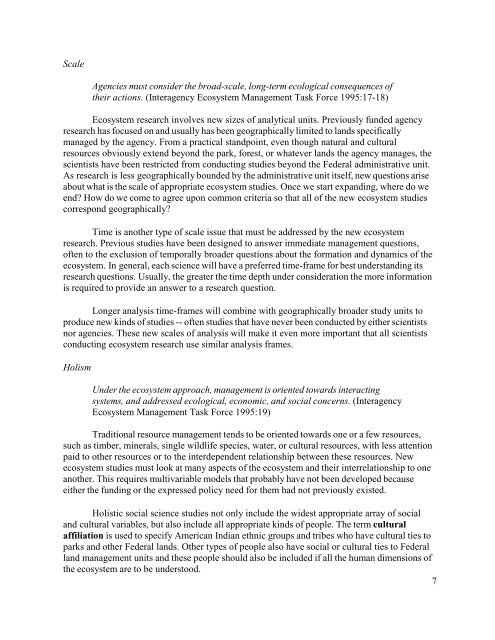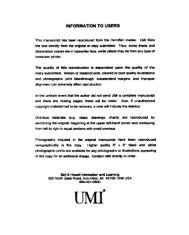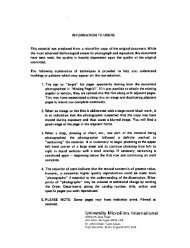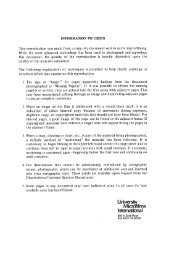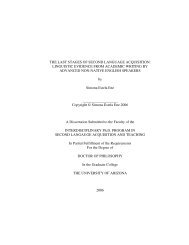- Page 1 and 2: Ethnographic Overview And Assessmen
- Page 3 and 4: TABLE OF CONTENTS List of Figures .
- Page 5 and 6: 5.1.2 Onsite Visits ...............
- Page 7 and 8: Bibliography ......................
- Page 9 and 10: Figure 5.15 Southern Paiute elders
- Page 11 and 12: ACKNOWLEDGMENTS This report is the
- Page 13 and 14: understandings between the federal
- Page 15 and 16: The NPS chose to consult only with
- Page 17 and 18: The ecosystem approach is a method
- Page 19 and 20: cultural, and economic well-being o
- Page 21: management. Agencies can also draw
- Page 25 and 26: Zion National Park Pipe Springs Nat
- Page 27 and 28: (1) Ethnoarchaeology:-the interpret
- Page 29 and 30: Creek and Johnson Wash. Additional
- Page 31 and 32: During the creation times Paiutes l
- Page 33 and 34: Time Period Early Reservation Europ
- Page 35 and 36: 1880 (as well as the second movemen
- Page 37 and 38: after almost a generation of doubt,
- Page 39 and 40: loss of their native deserts. In on
- Page 41 and 42: CHAPTER TWO AN ETHNOGRAPHIC AND ETH
- Page 43 and 44: Figure 2.1: Puxant Tuvip There was
- Page 45 and 46: 2.2 Aboriginal Political Units The
- Page 47 and 48: maneuvered themselves and families
- Page 49 and 50: The word "u-an-o" means farmers. Th
- Page 51 and 52: Figure 2.2: Kelly’s map of Southe
- Page 53 and 54: Figure 2.3: Yanawant irrigation. Fu
- Page 55 and 56: Figure 2.4: Hurricane Cliffs When F
- Page 57 and 58: The people of the Kaibab district l
- Page 59 and 60: A more basic question is where was
- Page 61 and 62: traditional lands because they have
- Page 63 and 64: The chapter is divided into five se
- Page 65 and 66: headed by John Wesley Powell and G.
- Page 67 and 68: At the time of termination, the Shi
- Page 69 and 70: available at the time. The Commissi
- Page 71 and 72: Figure 3.2The Fort and Pond at Pipe
- Page 73 and 74:
skills, folklife, and folkways..."
- Page 75 and 76:
American Indian religious practices
- Page 77 and 78:
of the park's resource management p
- Page 79 and 80:
3.4 Summary The relationship betwee
- Page 81 and 82:
Evidence of Paiute presence within
- Page 83 and 84:
Materialistically, the Southern Pai
- Page 85 and 86:
Southern Paiute people believe that
- Page 87 and 88:
4.1.5 Park Interpretation It is rec
- Page 89 and 90:
Kanab Creek and Virgin River Integr
- Page 91 and 92:
Figure 4.2 Webster Flats and Zaion
- Page 93 and 94:
to be neighborly, but the Indians w
- Page 95 and 96:
Figure 4.3 Seeps, such as this one
- Page 97 and 98:
and drink the water. This was a rel
- Page 99 and 100:
Salt Cave. A 78 year old woman from
- Page 101 and 102:
Kanab Creek is an ecoscape for Sout
- Page 103 and 104:
4.4 Conclusion Southern Paiute peop
- Page 105 and 106:
Kanab Creek Ecoscape: Main Stream T
- Page 107 and 108:
these places and resources in consu
- Page 109 and 110:
visiting medicinal springs, and gat
- Page 111 and 112:
1989-1996 A cultural resources prog
- Page 113 and 114:
The Ua'ayukunants lived upstream fr
- Page 115 and 116:
elsewhere as early as 1851. They ra
- Page 117 and 118:
Figure 5.3 Modern agriculture and h
- Page 119 and 120:
the fall of 1862 caused the expansi
- Page 121 and 122:
However, mountain mines had already
- Page 123 and 124:
The process by which the Shivwits R
- Page 125 and 126:
A road was built up into the canyon
- Page 127 and 128:
farmers in Zion country was a man c
- Page 129 and 130:
The town of Shunesburg was deserted
- Page 131 and 132:
conducting comprehensive ethnograph
- Page 133 and 134:
with the assistance of Mr. Jack Bur
- Page 135 and 136:
height above the river, kinds of ma
- Page 137 and 138:
would move on and gather something
- Page 139 and 140:
drainages and unstable, actively er
- Page 141 and 142:
Encelia frutescens Bush encelia Pro
- Page 143 and 144:
standing boulder, flakes, ceramic s
- Page 145 and 146:
idge in the center of Sec. 16, T41N
- Page 147 and 148:
Features Water. The Coalpits Wash d
- Page 149 and 150:
escarpment. The site is on the nort
- Page 151 and 152:
Animals. This upland valley would h
- Page 153 and 154:
interpreted to be trail guides used
- Page 155 and 156:
Archaeological Site Description The
- Page 157 and 158:
other deciduous trees. Common reed
- Page 159 and 160:
Perceived Impacts Other than touris
- Page 161 and 162:
The hanging gardens are notable for
- Page 163 and 164:
Archaeological Site Description The
- Page 165 and 166:
The focal point of the site is rock
- Page 167 and 168:
elder pointed out that in the past,
- Page 169 and 170:
Fraxinus anomala Singleleaf ash Sen
- Page 171 and 172:
Recommendations Paiute people with
- Page 173 and 174:
to the springs. Recent floods have
- Page 175 and 176:
hot springs in La Verkin, and he wo
- Page 177 and 178:
CHAPTER SIX PIPE SPRING NATIONAL MO
- Page 179 and 180:
Once the study site was defined, th
- Page 181 and 182:
1858-1905 Early Reservation 1906-19
- Page 183 and 184:
Navajos were forced to leave, and t
- Page 185 and 186:
The loss of resources had a dramati
- Page 187 and 188:
The Early Reservation Period Althou
- Page 189 and 190:
significance of specific resources
- Page 191 and 192:
Water Water is a central feature of
- Page 193 and 194:
Figure 6.5 Results of historic chan
- Page 195 and 196:
Figure 6.6 Upper Kanab Creek Featur
- Page 197 and 198:
were carried out only around the po
- Page 199 and 200:
Gutierrezia sarothrae Snakeweed Sph
- Page 201 and 202:
1967:2). After Frank died, his log
- Page 203 and 204:
Elders also mentioned a long histor
- Page 205 and 206:
time to tell stories...about the cr
- Page 207 and 208:
Artemisia filifolia Sand sagebrush
- Page 209 and 210:
Features We used to walk these hill
- Page 211 and 212:
CHAPTER SEVEN CULTURAL RESOURCE INV
- Page 214 and 215:
7.2 Southern Paiute Identified Plan
- Page 216 and 217:
Anemone tuberosa - Desert thimblewe
- Page 218 and 219:
desirable thatching material as wel
- Page 220 and 221:
Atriplex canescens - Four-wing salt
- Page 222 and 223:
water jugs (Stoffle, Halmo, Evans,
- Page 224 and 225:
In the past, tansy mustard has been
- Page 226 and 227:
Ephedra viridis - Indian tea Southe
- Page 228 and 229:
Eriogonum inflatum - Desert trumpet
- Page 230 and 231:
Halmo, Evans, and Austin 1994:243).
- Page 232 and 233:
Larrea tridentata - Creosote bush C
- Page 234 and 235:
Marrubium vulgare - Common horehoun
- Page 236 and 237:
Opuntia basilaris - Beavertail cact
- Page 238 and 239:
Penstemon palmeri - Palmer beardton
- Page 240 and 241:
Populus fremontii - Fremont cottonw
- Page 242 and 243:
64, 72). More recent studies show t
- Page 244 and 245:
and sheds, Sun Dance houses are mad
- Page 246 and 247:
Smilacina stellata - Solomon-seal T
- Page 248 and 249:
Swertia radiata - Deer-ears The roo
- Page 250 and 251:
Wyethia sp. - Mules’ ear Plants i
- Page 252 and 253:
inaccessible to them. The cultural
- Page 254 and 255:
Erethizon dorsatum - Porcupine Fowl
- Page 256 and 257:
Information about what is used, how
- Page 258 and 259:
1978:25-29). Variations of this sto
- Page 260 and 261:
Pituophus melanoleucus - Gopher Sna
- Page 262 and 263:
Aphelocoma coerulescens - Scrub Jay
- Page 264 and 265:
Charadrius vociferus - Killdeer No
- Page 266 and 267:
Gymnorhinus cyanocephalus - Pinyon
- Page 268 and 269:
Larus sp. - Gull Gulls are mentione
- Page 270 and 271:
Piranga ludoviciana - Western Tanag
- Page 272 and 273:
Zonotrichia leucophrys - White-crow
- Page 274 and 275:
Flea Matavi y umi, Matavi y um, or
- Page 276 and 277:
CHAPTER EIGHT MANAGEMENT RECOMMENDA
- Page 278 and 279:
may be unable to judge the full ram
- Page 280 and 281:
On March 15, 1993, the Grand Canyon
- Page 282 and 283:
She also expressed concern about in
- Page 284 and 285:
include the individuals who are spe
- Page 286 and 287:
[The park should] have people who k
- Page 288 and 289:
e collected at its source and piped
- Page 290 and 291:
Cultural Ecosystem as an example, m
- Page 292 and 293:
Resource Monitoring and Mitigation
- Page 294 and 295:
In addition, Southern Paiutes' conc
- Page 296 and 297:
BIBLIOGRAPH Y Adams, Winona 1930 Hi
- Page 298 and 299:
Desert Plants 4 (1-4). Bunte, Pamel
- Page 300 and 301:
Cronquist, A., A. H. Holmgren, N. H
- Page 302 and 303:
Evans, Michael J., Henry F. Dobyns,
- Page 304 and 305:
Gregory, Herbert E. 1948 Journal of
- Page 306 and 307:
Hufford, ed. Pp. 122-137. Urbana: U
- Page 308 and 309:
Little, James 1881 Jacob Hamblin. S
- Page 310 and 311:
1978 (1946)Why the North Star Stand
- Page 312 and 313:
2(3):67-90. Spencer, Joseph E. 1940
- Page 314 and 315:
1987 "Cultural Basis for Sport Angl
- Page 316 and 317:
Economical Route for a Railroad fro
- Page 318 and 319:
Wheeler, George M. 1875 Preliminary


